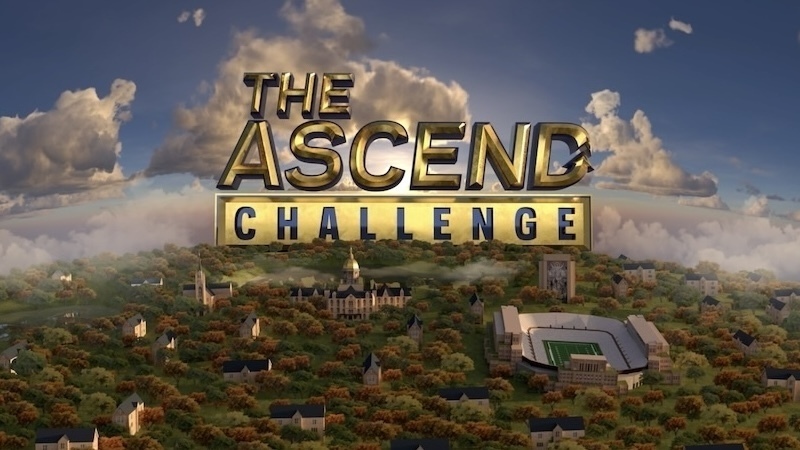Case Study
Projects Showcase |
ASCEND Program

Origins
In 2016, the Department of Mathematics piloted a version of Yale’s ONEXYS (Online Experience for Yale Scholars) program for incoming students at Notre Dame. Leveraging content generated by professors at Yale, ONEXYS-ND provided a free six-week, fully online summer program to a small cohort of first-year students. During the program, students reviewed mathematical and quantitative concepts in an online course and joined small video conference discussion groups weekly led by current Notre Dame student coaches.
After two years of running with Yale’s content, ONEXYS-ND proved to be a very promising program that provided some preseason math training for incoming students who wanted to pursue degrees in STEM fields. There were, however, areas for improvement. For one, there was a need for greater alignment with the content covered in first-year STEM courses at Notre Dame. Additionally, there was a desire from both the department and the students to have content that was designed and developed by Notre Dame faculty.
Rising to this challenge, in 2019, Professor Brian Mulholland began working with the Office of Digital Learning (ODL) to revise the ONEXYS program to better align with the needs of students entering Notre Dame. This new program would be called ASCEND, A Scholarly Community Entering Notre Dame.
Our Approach
Building off the success of the ONEXYS and the ONEXYS-ND initiatives, the goals of this project were to:
- Provide incoming ND undergraduate students the ability to succeed in math-intensive courses before arriving on campus in the fall;
- Provide them with a social connection to university life at Notre Dame; and
- Develop reusable learning materials that other courses or institutions can access, embed, or modify for their instructional uses.
Over a period of 12 months, the ODL team collaborated with Professor Mulholland and other colleagues from the Department of Mathematics to develop a media-rich learning experience for select incoming Notre Dame students. Kuangchen Hsu, the ODL’s senior learning designer, worked closely with Professor Mulholland and the other participating faculty to review the existing curriculum and instructional practices. A top priority was to ensure the new materials linked well with other instructional components of the program, meeting the academic goals while familiarizing students with Notre Dame’s campus, culture, and vital resources.
The new courseware was delivered in a carefully curated learning experience on the Canvas learning management system. Each week, students began with a narrative-based introductory video, which tied together the program-level goals of fostering a welcoming environment with the module level goals. Participants then watched asynchronous lectures before meeting with coaches and doing weekly assessments and reflections. Key to the learners’ experience within Canvas was the learner-centric design—intentionally crafted in collaboration between Hsu and Professor Mulholland—as well as the support present from Professor Mulholland and the coaches throughout the program.
Watch a Demo of the ASCEND Canvas Website
The team’s enthusiasm for diverse content and evidence-based practices allowed for the development of a varied course consisting of:
- Narrative-based weekly introductions
- Studio-filmed lectures and demonstrations
- Studio-filmed lightboard worked examples
- Interviews with faculty from across the University to tie together interdisciplinary applications of calculus
- Animations
- Student testimonials highlighting former students’ experiences and advice
- Knewton mastery-based assessments
- Weekly reflections
- Coach training sessions with former ASCEND participants
Results
“It was great to see diversity in the videos where the former ASCENDITES shared their stories. One in particular, [...] I felt impacted by his words. It motivated me, and made me feel more welcome.”
The two key indicators for measuring success were evidence of psychosocial support and evidence of academic support. These metrics were considered qualitatively through a post-course survey, and quantitatively through pre- and post-diagnostic tests, as well as through retention rates in the major.

The survey results demonstrated that students felt support both psychosocially and academically. Their proficiencies of tools and learning platforms such as Zoom and Canvas were above average at the end of the course.
Students felt more empowered to determine where they need help and how to ask for support. They also noted increased connections between the concepts and real-world application. In addition to increased academic self-efficacy, students also noted a heightened sense of belonging due to the program’s structure that supported relationships with peers and older students of similar walks of life.


Test comparisons between the pre- and post- diagnostic tests evidence the program’s success, where both averages and medians increased on the post test. The distributions of grades demonstrate an increase in the cluster of students testing at above 70% on the post test.

Retention rates in STEM also show above average rates, with ASCENDites being 78.25% likely to stay in STEM as opposed to a comparable rate of 66%.